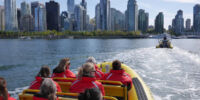
Details from the BC Government Release below:
Premier John Horgan and Carole James, Minister of Finance, have released Stronger BC for Everyone: BC’s Economic Recovery Plan.
The plan outlines the latest steps the Government of British Columbia is taking to help people, businesses and communities recover and come out of COVID-19 stronger and better prepared. BC’s total provincial response to the COVID-19 pandemic exceeds $8.25 billion.
“As British Columbians, we’ve been through a lot recently. We know our recovery won’t happen overnight, but by focusing on people and taking care of each other, we will ensure there are better days ahead for all of us,” said Premier Horgan. “The steps we are taking now will improve health care, get people back to work, support B.C. businesses and strengthen our neighbourhoods and communities.”
British Columbia entered the pandemic as an economic leader in Canada, making it among the best-positioned provinces to support a strong recovery. Since moving forward with a safe restart plan in mid-May, BC has had stronger-than-expected consumer spending, housing activity and employment gains. As of August 2020, almost 250,000 jobs had been restored, equal to 62% of the total jobs lost due to the pandemic.
“When COVID-19 first hit, we acted quickly to keep people safe and support those in need. While we are now starting to see hopeful signs of recovery, we know many people are still struggling and there is a lot of work left to do,” said James. “British Columbians are pulling together, and we’ll be there to support them every step of the way. Our province has a strong foundation to build a recovery that creates opportunities for all.”
The next steps in BC’s recovery plan will help build a stronger, more resilient economy for everyone.
- Making health care better by hiring 7,000 new front-line health-care workers. This includes thousands of health-care aides to manage outbreaks in long-term care homes and 600 contact tracers to help stop further spread in the community. The plan will also increase support for mental health care in the workplace and introduce a new Hospital at Home initiative that will allow patients to receive medical services in their own home from a team of health professionals.
- Creating jobs and opportunities by investing in targeted and short-term training in the skills people need to get work in high-demand fields, including for those who want to move into new, front-line health, child care and human-service positions. The plan will also expand Indigenous skills training and accelerate the creation of affordable child-care spaces so that more parents, particularly women, can get back to work. It includes investments of over $100 million to support tourism-related businesses and communities.
- Helping businesses grow and rehire with a 15% refundable tax credit based on eligible new payroll. It will also introduce a small- and medium-sized business recovery grant to support approximately 15,000 hard-hit businesses, while protecting as many as 200,000 jobs. Tourism operators will be eligible for a special top-up. The plan will also provide a temporary 100% PST rebate on select machinery and equipment to make it easier for eligible businesses to make the kinds of investments that will allow them to grow and become more productive.
- Supporting strong communities by investing over $400 million to revitalize community infrastructure and support local governments to provide the valuable services people depend on. This includes $100 million in infrastructure grants for shovel-ready projects that will create jobs right away. The plan also earmarks over $1 billion in provincial and federal investments to help keep people moving, whether by transit, TransLink or BC Ferries. An additional $540 million in combined federal/provincial funding will help B.C. communities address other local challenges impacted by COVID-19.
The plan includes $1.5 billion in economic recovery spending measures that respond to immediate needs. This money was earmarked for recovery spending in the spring. It is in addition to $660 million in tax measures and more than $1.86 billion in federal and provincial restart funding for municipalities, transit and education. It also builds on BC’s record $22-billion investment in public infrastructure over the next three years. Those capital projects are estimated to create 100,000 direct and indirect jobs over the life of the projects.
The next steps in BC’s recovery plan build on the progress it has made with new investments to support programs that will help expand CleanBC, reduce air pollution and tackle climate change, while preparing for its impacts and creating good, new jobs.
In developing the plan, BC engaged nearly 50,000 British Columbians in every region of the province, to hear their priorities and ideas through online surveys and virtual or telephone town halls. Premier Horgan and James also convened a series of meetings with business, labour and Indigenous groups, economists, youth, green technology experts, faith leaders and many more. The plan reflects what the Government of B.C. heard during these extensive public consultations.
The BC Green Party caucus was consulted on the development of this plan, which builds on shared priorities in the Confidence and Supply Agreement, including creating jobs, acting on climate change and building a sustainable economy that works for people.
Learn More:
Find out more and download the full report at: https://strongerbc.gov.bc.ca/
Find out more about the public engagement at: https://engage.gov.bc.ca/recoveryideas/
Read the news release: https://news.gov.bc.ca/releases/2020PREM0052-001780
Media Contacts:
Jen Holmwood
Press Secretary
Deputy Communications Director
Office of the Premier
[email protected]
250 818-4881
Ministry of Finance
Media Relations
250 213-7724





